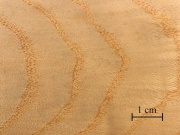Difference between revisions of "Japanese ash"
Jump to navigation
Jump to search
m (Text replace - "== Authority ==" to "== Sources Checked for Data in Record ==") |
|||
| Line 20: | Line 20: | ||
|} | |} | ||
| − | == | + | == Sources Checked for Data in Record == |
* R. J. Gettens, G.L. Stout, ''Painting Materials, A Short Encyclopaedia'', Dover Publications, New York, 1966 | * R. J. Gettens, G.L. Stout, ''Painting Materials, A Short Encyclopaedia'', Dover Publications, New York, 1966 | ||
Revision as of 05:50, 1 May 2016
Description
A hardwood obtained from the tamo tree, Fraxinus mandshurica, or other similar trees (F. longicuspis, F. sieboldiana, F. chinensis), native to Japan, China, and northeast Asia. The tamo tree produces an elastic wood with a straight grain that polishes well. The white to pale yellow wood has a coarse texture. Japanese ash is used for furniture, cabinets, tools, sporting goods, Veneer, and Plywood.
Synonyms and Related Terms
Asiatic ash; Manchurian Ash (Fraxinus mandshurica); Japanese Ash (Fraxinus longicuspis); Japanese Flowering Ash (Fraxinus sieboldiana); Chinese Ash (Fraxinus chinensis); tamo; shioji; yachidama
Other Properties
Specific gravity = 0.50
| Density | 31 ppcf |
|---|
Sources Checked for Data in Record
- R. J. Gettens, G.L. Stout, Painting Materials, A Short Encyclopaedia, Dover Publications, New York, 1966
- G.S.Brady, Materials Handbook, McGraw-Hill Book Co., New York, 1971 Comment: p. 74
- Gordon Hanlon, contributed information, 1998
- Kribs, Commercial Foreign woods on the American market Comment: p. 129
- Wikipedia, the free encyclopedia, at http://www.wikipedia.com Comment: http://en.wikipedia.org/wiki/Ash_tree (Accessed Dec. 9, 2005)
- Van Nostrand's Scientific Encyclopedia, Douglas M. Considine (ed.), Van Nostrand Reinhold, New York, 1976
- Random House, Webster's Encyclopedic Unabridged Dictionary of the English Language, Grammercy Book, New York, 1997
